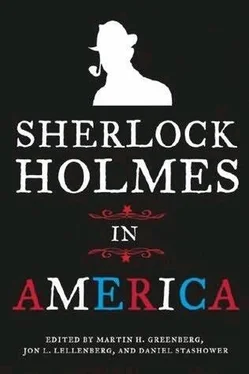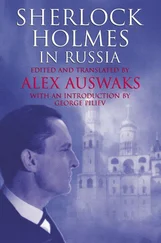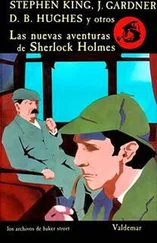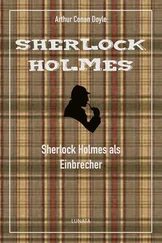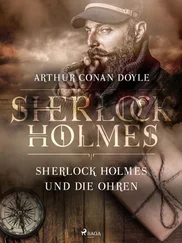Holmes took the violin, nodded, and rose to his feet. A bow was produced. Holmes tightened the bow, tuned the instrument to his satisfaction, then began to play. The tune he chose was a simple melody that I had heard one of the cowboys singing, called “The Streets of Laredo.” The sight of his absorbed face in the firelight, the rapt expressions of Señor Alvarez and his family, and the thought of all that this rustic fiddle stood for brought a tear to my eye. When he’d finished there was a little silence. He bowed and handed the instrument back to Alvarez.
“Mr. Barratt is offering you five hundred dollars for the violin,” he said.
“To put in their museum?”
“Yes.”
Alvarez stood for a while, deep in thought.
“It was our victory, not theirs,” he said at last. “It was our country, not theirs.”
Then he threw down the violin to the stone-flagged floor and stamped on it time and time again, like a man performing a Spanish dance, until he’d smashed it to smithereens.
“It is the greatest of pities,” I said, still shaken ,as we walked towards the hotel through the warm night. “To find Crockett’s violin and then have it end like this.”
Holmes laughed.
“My dear Watson, why should you think that fiddle was any more genuine than the other two? I’m sure Crockett was more likely to have died with his rifle beside him than his violin. No, Alvarez’s family tale was as much a fiction as the others, though I think the man himself believed it.”
“But the statement, Holmes, the paper in Spanish that you showed Barratt. Whatever it said seemed to be enough to convince you.”
He laughed.
“Did I say so? I simply showed Barratt a paper, and he chose to draw his own conclusion. I admit I took a small gamble. If he had happened to read Spanish, I should have had to do some quick thinking.”
“Holmes, what is this? What was on the paper?”
“You remember that first night, when we walked in the Mexican market, I found one of the local delicacies suited my taste. This morning, I descended to the kitchens of our hotel and was lucky enough to find a Mexican cook. She spoke few words of English but was obliging enough to understand what I wanted and write down the recipe. Tamales , I believe they’re called.”
“And you led Mr. Barratt to believe that this recipe was proof that-”
“I led him nowhere, Watson. He led himself. He had tried, for reasons that doubtless seemed honorable and patriotic to him, to take advantage of my reputation. This is a small revenge.”
“But what shall you tell him?”
“That the Alamo Museum must, alas, do without Colonel Crockett’s violin. Texas seems to be a resilient state. I hope it may learn to live with the disappointment.”
THE ADVENTURE OF THE WHITE CITY by Bill Crider
Bill Crider is the author of more than fifty published novels and numerous short stories. He won the Anthony Award for best first mystery novel in 1987 for Too Late to Die and was nominated for the Shamus Award for best first private-eye novel for Dead on the Island . He won the Golden Duck Award for best juvenile science fiction novel for Mike Gonzo and the UFO Terror . He and his wife, Judy, won the best short story Anthony in 2002 for their story “Chocolate Moose.” His latest novel is Murder in Four Parts . Check out his Web site at www.billcrider.com.

Ihave written little about Sherlock Holmes’s adventures in the United States, not least because Sherlock Holmes himself requested that I refrain from any attempt to tell how he occupied himself there. Both he and I agreed that it was best for me to confine myself to setting down what he did in his native England, if I had to set down anything at all. His inclination always was to believe that I exaggerated somewhat when reporting the events of his career.
Now, however, because Holmes has left London again and lives in pleasant anonymity, enjoying his view of the Channel and his bees, I believe that he would not take it amiss if I were to set on paper at least one of his adventures in the New World. He said as much at one time. The story that comes to mind happened the year after the strange events at Wisteria Lodge, and Holmes and I had special reason to remember it, as we discussed one evening as we sat in our rooms at 221B Baker Street.
I remember the night well. The moon was full, and its light shone through the windows overlooking the street. The windows were closed, and a brisk wind swept down the street, occasionally rattling a somewhat loose pane. Holmes, whose powers of concentration far exceed my own, showed no sign that the faint noise bothered him, or that he heard it at all. He sat reading the day’s news, and I said to him, “It must bother you a great deal, Holmes.”
He lowered the newspaper, looked at me over the top edge of it, and said, “Whatever do you mean by that, Watson?”
“The fact that you share a name with one of the most shockingly brutal and cruel murderers of this century.”
“You surprise me, Watson,” said Holmes, lowering the newspaper into his lap.
“Furthermore,” I said, “it must disturb you greatly that you were in the same city with him and knew nothing of his frightful depredations.”
“You are positively brilliant this morning, Watson,” said Holmes. “For those are my thoughts exactly. How, pray tell, did you come to fathom them?”
“I know your methods, Holmes,” said I, perhaps a bit too smugly. All too often in the past, Holmes had amazed me by seeming to read my mind, when in reality he had merely been observing me. Being able to turn the tables on him was a pleasant diversion.
Holmes put the newspaper aside and went to the chimneypiece to fetch the Turkish slipper in which he kept his tobacco. Having done so, he reached into the pocket of his robe and brought out a briar pipe.
When Holmes had filled it with tobacco and lit it, he looked at me and said, “You, of course, saw the newspaper earlier and read about the trial of the notorious ‘Torture Doctor,’ known as H. H. Holmes, and surmised the rest.” He paused and puffed on the pipe to make sure the tobacco was burning to his satisfaction. “I do not believe we have mentioned the similarity of the names before, but you are quite correct, Watson. It does bother me a bit that Mudgett should have chosen for himself my own patronym, but that is not his only alias. He has had many others.”
“And he will soon meet his well-deserved end under the original name of Mudgett,” said I. “Was the other point I mentioned also correct?”
“That I am bothered by having been in some proximity to Mudgett without knowledge of his crimes? Yes, Watson. I wish that I had known something of them at the time. With that knowledge I might have been able to put a stop to him before he had killed so many.”
“How many? Is the number even known?”
“No,” said Holmes. “Some surmise he may have done away with more than a hundred victims, but I suspect the number twenty-seven is much more likely.”
He resumed his seat in the chair and took up the newspaper once more.
“I remember your desire to visit the Columbian Exposition in Chicago,” I said. “And to see Buffalo Bill’s Wild West once again.”
Holmes had become quite a student of the history of Buffalo Bill Cody and the American West after his first meeting with the man. He put aside the newspaper again and glanced at the patriotic V. R. formed by bullet holes in the wall.
“Yes, indeed, Watson. Meeting Colonel Cody at the time of the Golden Jubilee was quite interesting. He and I have something in common, I believe.”
Читать дальше
